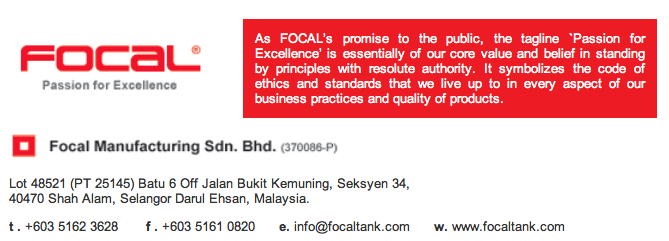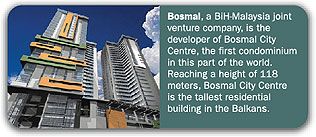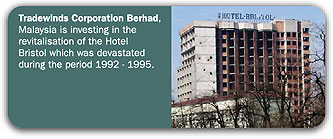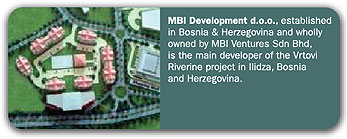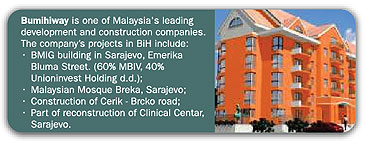Country Focus: Bosnia & Herzegovina
 Revitalised And Forward-looking Economy
Revitalised And Forward-looking Economy
BiH’s accelerated economic reform process has greatly improved the business climate and the country has the fastest growing economy in South Eastern Europe. The economy has grown at a steady pace of 5% per year since 2000. A sustained annual increase of GDF? combined with rapidly rising production levels and export volumes, provides a clear indicator that the economy is in full expansion.
The stability of the konvertibilna marka (KM) — BiH’s currency — further contributes to the country’s favourable business climate in the country. It is pegged to the Euro with a fixed exchange rate of 1 KM = 0,51 EUR. The underlying inflation rate is the lowest in the region. VAT was introduced in 2006 and inflationary pressures are well under control.
The privatisation process for companies has been accelerated to increase economic growth and encourage foreign investment. Additionally, powerful modern bankruptcy laws provide a flexible system for maximising the economic value of companies in financial distress to create potentially valuable opportunities for foreign investors. BiH has signed a number of free trade agreements with neighbouring countries and is negotiating its entry into CEFTA and the WTO. Additionally, investors will benefit from its preferential trade regime with the Europe Union. BiH also has preferential export agreements with Canada, Japan, Russia, Turkey and the USA.
Agriculture & Food Processing
With over 1.5 million hectares of agricultural land for crop growing and livestock rearing, BiH offers ideal conditions for growing wheat, maize and vegetables, and industrial crops such as flax and hemp.
There is great market potential for BiH fruit and vegetable producers, as well as opportunities in wine production, tobacco farming and the cultivation of lavender and other aromatic herbs. BiH is also known for its high-quality medicinal herbs which are used in pharmaceutical and cosmetic industries. Fish farms thrive in the clear, unpolluted rivers that criss-cross the country. Foreign companies have already taken advantage of investment opportunities in the sector, but still more remain to be seized.
Automotive Industry
BiH companies are renowned suppliers of quality components. Major brands have long relied on the skilled BiH workforce to assemble cars for western markets. For example, BiH is well under way to be the Volkswagen Group’s supply-base in South Eastern Europe with a market of 120 million consumers. BiH’s strength in the automotive components industry lies in the availability of skilled labour in engineering and other technical areas including R&D. Companies in the automotive cluster are always looking for investment partners to expand production into international markets.
Banking & Financial Services
BiH is the first country in South Eastern Europe to completely reform its banking system. Foreign banks have invested significantly. Foreign banks own 73% of the banking sector, ensuring employment for almost 9,000 people. Leading international credit rating agency, Moody’s Investor Service upgraded BiH’s rating from a positive outlook’ to a stable’ outlook in just 2 years. The country’s stock exchanges are enjoying a period of impressive growth. The challenge for the future is to diversify the range of financial services and other key segments of the market, and ultimately create even more business opportunities.
Energy
The basic sources of primary energy in BiH are coal and hydro-power. The potential for investors is in the construction of over 200 small hydroelectric power plants. There are also opportunities in renewable sources of energy, such as wind energy, solar energy and geo-thermal energy. BiH also has considerable reserves of brown coal, lignite and peat which provide opportunities to investors via the construction of new coal mines and other related infrastructure. With respect to long-term projected gas demand, the investment potential of the gas sector in BiH is enormous.
Forestry & Wood Products
50% of the country is covered in forests. Beech, oak, ash, pine and fir as well as more specialised woods such as walnut, apple and cherry, are exported as raw material, half fabricates and finished products. The abundance of both hard and softwood as well as the low-cost, skilled labour force combined with manufacturing facilities exceed domestic demand to make this sector export-oriented. Currently, the largest markets for these products are Germany and Italy but the potential to export to other countries is vast.
Tourism
Tourism is a booming sector and investment opportunities abound. BiH has world-class ski slopes and was host country of the 1984 Winter Olympic Games. The national parks and nature reserves are also simply breathtaking. Moreover, BiH has tremendous potential for specialised branches of tourism since it has a lot of unexplored and unexploited destinations. With its rich and uniquely complex historical, cultural, culinary and religious heritage, BiH is not only a very interesting destination but also a lucrative place to invest.
Privatisation Opportunities
Privatisation in BiH provides an array of opportunities to foreign investors to participate in the purchase of the state capital, including enterprises, banks and apartments with existing tenancy rights. An estimated 60% of small companies and more than 30% of the large ones are now privately owned or publicly traded. Nevertheless, a number of these strategic enterprises’, which includes large enterprises, telecommunications and power utilities sectors, public utilities, mines, etc, are still not privatised, presenting a choice of opportunities for potential foreign and local investors.
INCENTIVES FOR FOREIGN INVESTORS
 • Foreign Investors Support Fund
• Foreign Investors Support Fund
• The Law on the Policy of Foreign Direct Investments of BiH ensures foreign investors have the same rights and obligations as BiH residents
• Foreign investors are entitled to open accounts in any commercial bank
• Foreign investors are entitled to freely employ foreign nationals Foreign investors are protected against nationalisation, expropriation, requisition, etc
• Investment capital is exempt from import customs and customs duties with the exception of passenger cars, slot and gambling machines (Subject to application approval)
• The rights of foreign investors granted by the Law on the Policy of Foreign Direct Investment cannot be overruled by subsequent laws and regulations. However, should a subsequent law or regulation be more favourable to foreign investors, the investor has the right to choose the regime by which the investment will be regulated
• Foreign investors may own real estate in BiH and enjoy the same property rights as BiH citizens and legal
entities
• Foreign investors are entitled to transfer abroad, freely and without delay, in convertible currency, proceeds resulting from their investment in BiH
• Free trade zones
• Tax exemptions
MALAYSIA INVESTOR IN BOSNIA AND HERZEGOVINA
From The MATRADE Desk: Chile: An Emerging Market In The Southern Cone
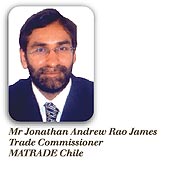 Trade & Economy
Trade & Economy
 Chile has an open but very competitive market. Its exports primarily include resource-based goods: mining products, mainly copper and derivatives account for 59% of merchandise exports and agricultural goods for about 28%. Chile’s export partners are: USA, North East Asia, Latin American countries and the EU. Imports include a wide range of manufactured goods and petroleum. Chile’s import partners are countries within Latin America, USA, the EU and North East Asia.
Chile has an open but very competitive market. Its exports primarily include resource-based goods: mining products, mainly copper and derivatives account for 59% of merchandise exports and agricultural goods for about 28%. Chile’s export partners are: USA, North East Asia, Latin American countries and the EU. Imports include a wide range of manufactured goods and petroleum. Chile’s import partners are countries within Latin America, USA, the EU and North East Asia.
In 2007, Chile’s economy grew 5% while internal demand and private consumption increased 7.3% and 7.7%, respectively. Its exports rose 17.5% to US$68.3 billion and imports appreciated 22.1% to US$43.8 billion in 2007. FDI was recorded at US$15.3 billion. For 2008, Chile is forecasted to register GDP between 4.6% and 4.8% with inflation projected at 3.6%. Recently, the Central Bank of Chile announced the move to raise the interest rate from 6.0% to 6.25% to combat the inflation rate and reduce money circulation in the market. Trade plays an important role in Chile’s economy. The share of goods and services in Chile’s GDP increased to over 50% in 2007. Chile’s trade relations are focused on the negotiation of bilateral and free trade agreements and liberalisation initiatives. Tariff reductions under preferential agreements have contributed to improved access to the Chilean market for partners where duty free access or an average of 3% duty is offered to most imports.
International Trade Agreements
ETA or EPA frameworks have been the main selling point to attract foreigners to establish their presence here. It also helps local companies and industries meet import requirements more competitively and support business expansions. Currently, Chile has 18 trade agreements with 56 countries, accounting for about 85% of its trade, which also provides market access to over 2.4 billion people. Chile has preferential trade agreements with Mexico, Ecuador, Bolivia and Peru, CAFTA (Costa Rica, El Salvador, Nicaragua, Guatemala, Honduras), Canada, the EU and European Free Trade Association (EFTA), US, South Korea, Singapore, New Zealand and Brunei, China, Japan, Colombia and Panama. New trade agreements that open markets in Asia are the country’s top priority, especially in Asia Pacific countries like Malaysia, India, Australia and Vietnam.
Chile-Malaysia Trade Relations
Chile is Malaysia’s third important trading partner, third largest export destination and third biggest import source in South America. In 2007, bilateral trade between Malaysia and Chile totalled US$242.7 million with exports amounted to US$169.7 million and imports valued at US$73 million. Major Malaysian exports were electrical & electronics (64%), furniture (10%), rubber gloves (6%) and palm oil (2.4%). Imports from Chile were iron ores & concentrates, chemical wood pulp, frozen fish, fillet and caviar, seafood, fruits and wines, collectively accounting for 91.6% share. The trade balance has been in favour of Malaysia for the last three years and a hefty surplus of US$96.7 million was registered in 2007. To further strengthen trade and economic relations, Malaysia and Chile is negotiating for a Malaysia-Chile ETA. This will allow both countries to tap on the opportunities arising from their respective ETA arrangements.
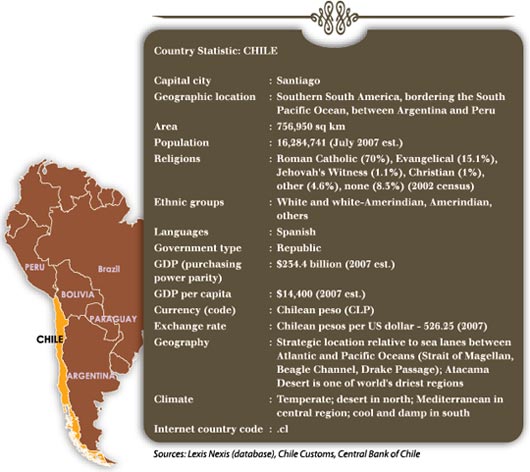
A Burgeoning Retail Sector
Chile’s low unemployment rate has resulted in a larger consumer base with better purchasing power and an improved standard of living. The Government of Chile recently granted a 6% salary increase for its civil servants while the minimum salary for blue-collar workers was revised from US$240 to US$270. Consumers now have an increased buying ability which also accounts for an escalated demand for imported and branded products. The retail sector accounts for 20% of Chile’s total GDF? Registering the biggest growth among Latin American retail sectors, the Chilean retail sector’s foreign investments last year totalled US$535 million (34% of total invested abroad by Chilean companies).
Major retail stores in Chile prefer importing products directly because of the depreciation of the US dollar. Import goods are now more attractive as the exchange rate stands at 1US$=CP$460. To remain competitive, Chilean retail stores and supermarkets are also looking to secure better prices for a variety of products from reliable manufactures or suppliers. This provides many export opportunities for Malaysian companies. As the volumes demanded are big, suppliers must have a good track record, sufficient supply capacity and be prepared to provide favourable business terms and conditions. Chilean retails stores are moving towards the production of in-house brands and private labels. To meet local market demand, products like electrical appliances and white goods are sourced from abroad. Malaysian companies can bid for contract manufacturing or secure partnerships through joint venture and franchising.
 Zofri Free Trade Zone
Zofri Free Trade Zone
Products coming into Zofri, which is located in Northern Chile, are exempted from import duty. Other than warehousing, there are facilities available for bulk breaking and value-adding activities. At present, there are over 1,600 companies operating in Zofri, representing a wide range of industrial and consumer products. Among the international operators are Kia Motors, Philips and Sony. Foreign products entering Zofri are offered
tariff concessions from Chile’s free trade and economic complementary agreements provided they meet local content requirements. Malaysian exporters may also use Zofri as a distribution channel for exporting to other South American countries. Large Malaysian companies may also consider establishing a Malaysian Mall similar to what China has done in Chile in order to enhance the positioning of its products in the market.
Pointers For Malaysian Exporters
Good pricing, an assortment of products, reliable quality and an adequacy of supply are strengths that Malaysia exporters should emphasise on. Attractive after sales service and technical support including warranty terms could be offered on an exclusive basis to local distributors. Malaysian companies should preferably have ISO, six-sigma and other international accreditation. Exporters must be able to consolidate shipment as the import volumes demanded by SMEs in Chile are small. Buyer credit facility of 60, 90 or 120 days and quantity discounts would be added advantages. Malaysian exporters need to be more aggressive and demonstrate flexibility and reliability plus a readiness to establish long term relationship vis-à-vis competitor suppliers in the marketplace. Malaysian products that have export potential are electrical & electronics, palm oil, furniture, rubber products, security products, garments, fabrics & yarns, building materials, toiletries, medical disposables & equipment, processed food, energy drinks & tropical beverages, auto parts & accessories, cars & motorcycles, household articles & decorative items, educational toys, mining equipment and portable generators.
Investment Opportunities
There are also opportunities to be tapped in the IT, construction/infrastructure development, mining, forestry, and energy/power sectors. The construction sector in Chile has been growing in the region of 7% per annum, so there will be an abundance of private construction projects that Malaysian companies can participate in. With the country facing an acute energy shortage due to a cut in the supply of natural gas from Bolivia and Argentina, foreigners are encouraged to propose and initiate projects related to alternative energy generation.
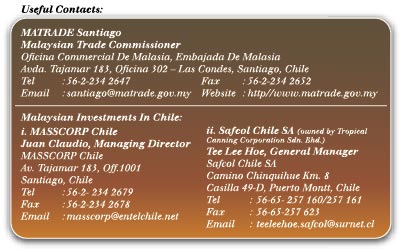
Sarawak Economic Development Corporation (SEDC) – An Investment Window To Sarawak
 Sarawak, with a total land area of 124,000sq km, is the largest of the 13 states in Malaysia and encompasses 37.7% of the country’s entire land mass. Sarawak is at the heart of the Asia Pacific region, being geographically situated in the north-western stretch of the island of Borneo. With its strategic location, Sarawak is emerging as a profitable investment hub offering cost-competitive advantages with good transportation and telecommunication linkages.
Sarawak, with a total land area of 124,000sq km, is the largest of the 13 states in Malaysia and encompasses 37.7% of the country’s entire land mass. Sarawak is at the heart of the Asia Pacific region, being geographically situated in the north-western stretch of the island of Borneo. With its strategic location, Sarawak is emerging as a profitable investment hub offering cost-competitive advantages with good transportation and telecommunication linkages.
Sarawak is endowed with an abundance of natural resources like petroleum, natural gas, minerals, agricultural and forest products. Today Sarawak continues to grow its niche economic activities and resource-based industries. By prudently managing its natural resources and emphasising on more down-stream processing, Sarawak is ensuring higher value from these products. The State Government is promoting petrochemicals, forestry and wood-based industries, agro-based activities, biotechnology as well as mineral-based and energy-driven industries.
 Already one of the world’s largest exporters of natural gas, the State is committed to promote the manufacturing of higher value-added petrochemical products.
Already one of the world’s largest exporters of natural gas, the State is committed to promote the manufacturing of higher value-added petrochemical products.
In forestry and wood-based activities, Sarawak is active in all stages of production; from logging to related down-stream activities, in a concerted effort to become a globally recognised producer of high quality tropical hardwood products. Regulations regarding sustainable forestry management and the implementation of large-scale reforestation programmes also help to ensure the future of this sector.
The agro and food industries are currently based on oil palm, pepper, rubber and sago. Plans are in place to develop other agricultural and food crops, and expand the scope of down-stream products to create agro-based industry clusters. Aquaculture and the processing of fish and fish products offer tremendous opportunities.
There is great potential in biotechnology due to Sarawak’s biodiversity. R&D and industry partners are invited to explore its rich flora & fauna for pharmaceutical, nutritional and other bio-products.
Shipbuilding is another major industry in Sarawak which the government intends to continue developing.
The State Government offers attractive incentives to investors, particularly in the electronic sector which also benefit from federal subsidies. Sarawak has excellent infrastructure, reliable facilities & amenities as well as a safe and clean living environment. The State Government remains proactive, customer-focused and very supportive of business and economic growth.
Sarawak Economic Development Corporation (SEDC)
The Sarawak Economic Development Corporation (SEDC) is a statutory agency set up by the Sarawak Government on I March 1972 to promote the commercial, industrial and socio-economic development of Sarawak. It promotes investment in Sarawak and where necessary, serves as a joint-venture partner. The SEDC is also a trust agency to promote the participation of “Bumiputras” (indigenous people) in commerce and industry.
Its diversified range of projects and business activities includes tourism and leisure, mineral and mining/roads and works, agro-based, property and entrepreneur development.
The Tourism and Leisure Sector focuses on hotel and resort development, shopping centres and golf course to complement the State’s tourism promotion drive. Among the examples are Holiday Inn Kuching, Holiday Inn Damai Beach, Crowne Plaza Riverside Hotel, Sarawak Cultural Village, Damai Beach Golf Course, Parkcity Everly Hotel, Miri, Parkcity Beverly Hotel, Bintulu and Royal Mulu Resort.
The Mineral & Mining/Road Works Sector plays a major role in complementing the State Governments effort in infrastructure development. Principal activities are quarrying, supply of premix, trading of building materials, road maintenance and infrastructure development.
The Agro-based Sector is mainly centred on livestock, plantations and aquaculture. Its cattle farms in Karabungan, Miri Division, Northern Territory, Australia and newly acquired cattle station in Queensland, Australia provide sufficient fresh meat to meet the States requirement.
Property development is another key SEDC activity, comprising both commercial and socio-economic projects.
Entrepreneur Development
A significant role of SEDC is the development of Bumiputra’ entrepreneurs through the following programmes:

Currently, SEDC has more than 46 active subsidiaries and associate companies with group assets totalling more than RMI.68 billion. It is a dynamic and reputable organisation working on the 4Es principal: to carry out its tasks ethically, effectively, efficiently and economically. SEDCs corporate philosophy is to provide the best quality and value in everything it does, through integrity, teamwork and total quality management.

Diary Of Events
Courtesy Call On The Malaysian Ambassador To Vietnam,
7-10 January 2008
Ms Ng Su Fun, together with representatives from IJM Corporation Bhd, Salcon Engineering Berhad and Binh An Water Corporation Ltd made a courtesy call to the new Malaysian Ambassador to Vietnam.
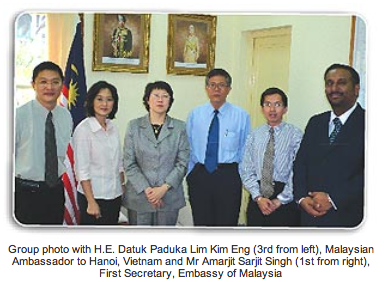
Vice President MASSA, Tan Sri Dato’ Michael Chen Wing Sum on a working trip to Danang, Vietnam,
28-30 March 2008
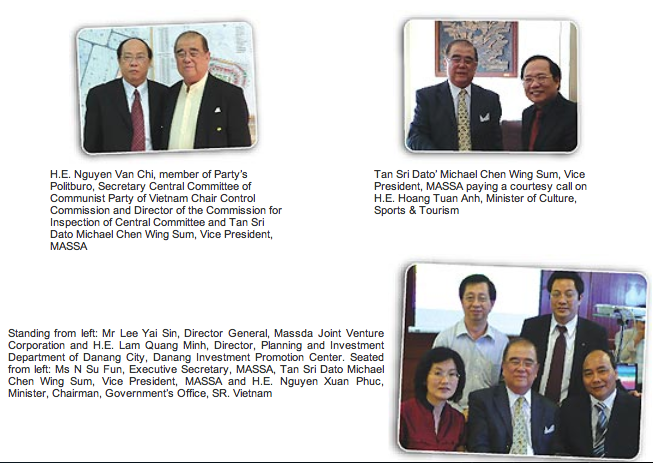
MIDA And MASSA Meeting With Heads And Officials Of The Diplomatic Missions In Malaysia At MIDA’s Office,
17 January 2008
MIDA and MASSA would be continuing on the seminar series to inform Malaysian businesses on opportunities of doing business with South-South Countries. A meeting with Heads and Officers of 17 diplomatic missions namely; Algeria, China, Egypt, Fiji, Ghana, India, Laos, Morocco, Namibia, Philippines, Sudan, Thailand, Venezuela and Vietnam was held at MIDA whereby the representatives of these countries were invited to participate in the country seminars by fielding speakers to promote business opportunities in their respective countries.
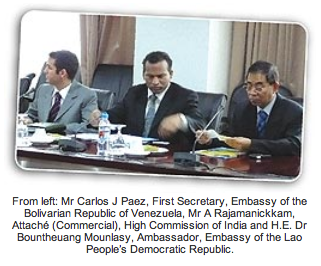
The South-South Information Gateway (SSIG) Aims For Tangible Results
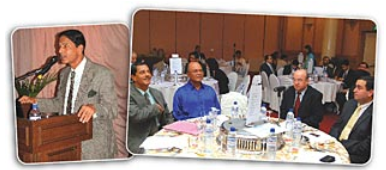 The South-South Information Gateway (SSIG) was established as a depository and an exchange centre for information, news and broadcast materials – like documentaries, films, radio and TV programmes – from the South fraternity. These materials are produced by the South nations and offer their own unique perspectives on issues and events in line with SSIG’s main aim of promoting understanding, solidarity, trade and investment among the South countries.
The South-South Information Gateway (SSIG) was established as a depository and an exchange centre for information, news and broadcast materials – like documentaries, films, radio and TV programmes – from the South fraternity. These materials are produced by the South nations and offer their own unique perspectives on issues and events in line with SSIG’s main aim of promoting understanding, solidarity, trade and investment among the South countries.
The centre would also be a catalyst to enhance the sharing of experiences, knowledge, expertise and skills, the basics of a smart partnership in facing the increasing challenges of globalisation. It is hoped that the South-South Information Gateway would be a major forum for South countries to tell the whole world what is happening within their own national boundaries through their own eyes and perspectives, thus projecting a more accurate and balanced picture of themselves.
SSIG welcomes all public broadcasting organisations or public agencies in the South fraternity to join them in this endeavor to promote a greater and smoother flow of information between nations. Information gathered will be displayed in the SSIG portal (www.ssig.gov.my) and stored in the SSIG’s E-Depository for retrieval by Smart Partners.
In 2007, SSIG has organised events to share experiences and ideas. They are as follows:
- Forum on Stereotyping by the Media: Implications for South Nations”
- UNESCO Conference on Management of Information Pertaining to Health Crisis”
- Forum on Poverty Eradication: Sharing Experiences and Lessons Learnt Among South Nations”
- Exhibition on “40th Anniversary of the Association of Southeast Asian Nations (ASEAN)”
- Forum on “Political Stability and Good Governance: Prerequisites to Nation Building”
In 2008, SSIG has launched a new platform for the South-South nations to share information and experiences with an eye for more tangible results. That new platform is a series of luncheon talks, the first of which was by the High Commissioner of Bangladesh to Malaysia, H.E. Mohammad Khairuzzaman, who spoke on “Trade and Investment Opportunities in Bangladesh”. Held at the Bukit Kiara Equestrian & Country Resort on March 13, 2008, the talk was attended by about 60 foreign diplomats based in Kuala Lumpur, representatives of the Malaysian private sector and Government officers.
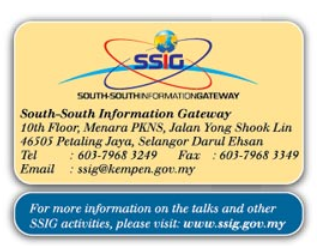 In line with its aim of sharing information, experiences and lessons learnt, the South-South Information Gateway, a division of the Ministry of Information, will work closely with the Malaysia South-South Association (MASSA) to make this luncheon talk events, a tripartite collaboration between the foreign diplomats, the Malaysian private sector and Government agencies, a success.
In line with its aim of sharing information, experiences and lessons learnt, the South-South Information Gateway, a division of the Ministry of Information, will work closely with the Malaysia South-South Association (MASSA) to make this luncheon talk events, a tripartite collaboration between the foreign diplomats, the Malaysian private sector and Government agencies, a success.
From the feedback of the participants, SSIG intends to use the lunch meeting to focus on issues and areas of interests of the three sectors. Several of the diplomats have expressed their interest to speak at future events and SSIG plans to provide them with the platform, all within this year. Also lined up are talks by Malaysian officials and SSIG will work with MASSA to bring representatives of the Malaysian private sector into the forum for networking as well as for more tangible results.
Showcase Malaysia 2008
Showcase Malaysia 2008 was held from March 20 – 22, 2008 at Dhaka Sheraton Hotel, Dhaka, Bangladesh. Organised by the Bangladesh — Malaysia Chamber of Commerce and Industry (BMCCI) in collaboration with the Malaysian High Commission in Bangladesh together with the support from MASSA and MATRADE, the event pulled together a total of 43 companies. The main objective of the showcase was to provide a platform for business communities of Bangladesh and Malaysia to establish and foster business linkages and collaborations.
The event featured various range of products and services, amongst them :

In conjunction with this showcase, MATRADE organised a marketing mission to Chittagong and Dhaka from March 17 – 23, 2008. 9 companies participated in the marketing mission. Tan Sri Dato Soong Siew Hoong also participated in the event and led a team from ACCCIM. MECD, led by the Deputy Secretary General, Dato’ Mohd Hashim Bin Abdullah, participated with 7 companies. Many business meetings were held between the Bangladeshi and Malaysian businessmen during the 3 days event to establish and foster business linkages and collaborations.
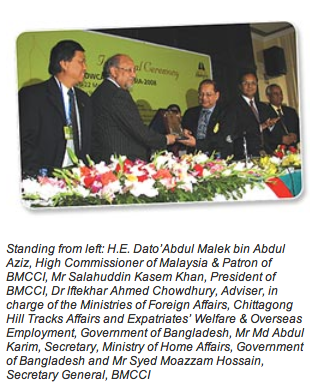 Opening Ceremony of Showcase Malaysia 2008
Opening Ceremony of Showcase Malaysia 2008
The opening ceremony of Showcase Malaysia 2008 was held on March 20, 2008. Chief Guest, Dr lftekhar Ahmed Chowdhury, Advise in charge of the Ministries of Foreign Affairs, Chittagong Hill Tracks Affairs and Expatriates’ Welfare & Overseas Employment, Government of Bangladesh graced the event. The event was also attended by two special guests, ie. H.E. Dato’ Abdul Malek bin Abdul Aziz, High Commissioner of Malaysia & Patron of BMCCI and Mr Md Abdul Karim, Secretary, Ministry of Home Affairs, Government of Bangladesh. H.E. Dato’ Abdul Malek bin Abdul Aziz, in his speech reported that presently, Malaysia has 59 projects with investments worth US$1.337 billion in Bangladesh’s telecommunication, textiles, banking & insurance, healthcare, real estate, power and infrastructure sectors while exports to Bangladesh reached US$437.5 million (RM1.4 billion) in 2007. Imports from Bangladesh in year 2007 amounted to US$34.65 million (RM11O.89 million). Mr Salahuddin Kasem Khan, President of BMCCI delivered his welcome address at the opening ceremony. Mr Syed Moazzam Hossain, Secretary General, BMCCI & Chairman of the Organising Committee of Showcase Malaysia 2008 delivered a vote of thanks to all participants and sponsors for making the event a success.
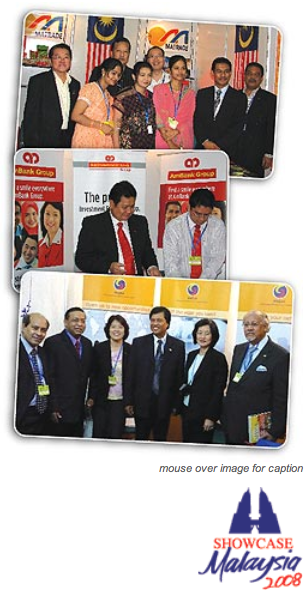
Showcase Malaysia 2008 – Stalls’ visit
A total of 43 stalls were set up and the participating organisations were:
- MATRADE
- MASSA
- Alami Vegetables Oil Products
- MECD
- AKTEL
- Alcomas Sdn Bhd
- Amalgamated Batteries Manufacturing (Sarawak) Sdn Bhd
- Ambank Group
- A-Team Resources Sdn Bhd
- Bengal Meat Processing Industries Ltd
- Cosmopoint Sdn Bhd
- Eastern Overseas Shipping Lines Ltd
- F.I.T Centre Sdn Bhd
- Kotra Pharma Sdn Bhd
- Malaysia Airlines
- Multigrow Disposable Products Sdn Bhd
- Norz Beauty House Sdn Bhd
- Prime Bank Limited
- Powerhouse Furniture Ptd Ltd
- Pro-Landscape Structure Sdn Bhd
- Shaheen Food Products
- Shiro Travel & Tours Sdn Bhd
- Ampang Puteri Specialist Hospital
- Ayamas Food Corporation Sdn Bhd
- BMCCI
- Dunham-Bush Industries
- Epic Tips Sdn Bhd
- Kampong Koh Sauce (M) Sdn Bhd
- Lim Kok Wing University
- Malaysian Palm Oil Council
- My Ideal 2nd Home Sdn Bhd
- Tourism Malaysia
- University College Sedaya International
- Water Care Vision Sdn Bhd
- T.H. Hin Home Tech Sdn Bhd
- United Hospital Limited
- Verstaerker Rolle (M) Sdn Bhd
- Wengcon Machinery Sdn Bhd
- Tenaga Prisma Manufacturing Sdn Bhd
- Universiti Kuala Lumpur
- Vitation (M) Sdn Bhd
- Sireh Emas Marketing Sdn Bhd
- The Trading International
The participating companies represented a good mix of Malaysian industries. Local trade visitors and the general public attended the event. Business enquiries and meetings with the exhibitors were held in their respective stalls. The exhibition, pulled together trade visitors as well as non trade visitors. The crowd was bigger in the afternoon due to the participation from the public.
Showcase Malaysia 2008 – Reception Host By MATRADE

Showcase Malaysia 2008 – Visit to Malaysia Trade Centre
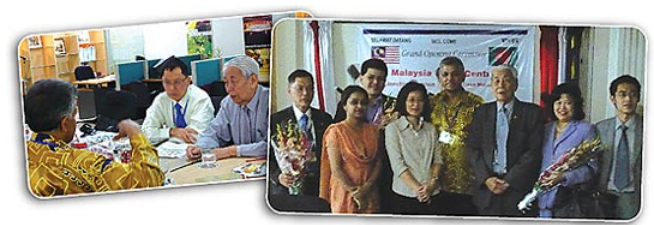
Tan Sri Dato Soong Siew Hoong, EXCO member of MASSA and Secretary General of ACCCIM led a team to visit the Malaysia Trade Centre in Gulshan. The team met Mr Mohammed Masudur Rahman, Chairman of the Malaysia Trade Centre and held discussions on fostering business linkages between Malaysia and Bangladesh.
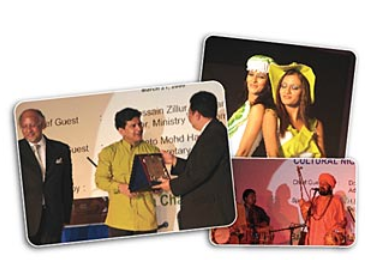 Gala Dinner sponsored by AmBank Group
Gala Dinner sponsored by AmBank Group
AmBank Group sponsored the gala dinner on March 21, 2008 attended by Dr Hossain Zillur Rahman, Honorable Adviser, In — Charge of the Ministry of Commerce and the Ministry of Education as the Chief Guest and Dato’ Mohd Hashim bin Abdullah, Deputy Secretary General (Entrepreneur), Ministry of Entrepreneur and Cooperative Development as the Chief and Special Guest respectively. 300 guests were invited to the dinner. The dinner guests were treated to Bangladesh cultural performances and fashion shows before the commencement of the dinner.
Showcase Malaysia 2008 – One to one meetings
One to one meeting were organise by MATRADE for the marketing mission participants and the exhibitors of the showcase.
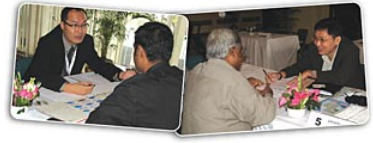
Business Enquiries
Business enquiries received at MASSA booth include the following:-
Investment/joint ventures opportunities in:-

To import from Malaysia:-

To export to Malaysia:-


Editorial
Showcase Malaysia 2008 held in Dhaka, Bangladesh from 20 – 22 March was a success. A total of 37 companies from Malaysia participated in the event. The 3 days inaugural event, was supported by MATRADE who participated not only with the uptake of booths from Malaysian companies but also brought a marketing mission to Bangladesh, visiting Chittagong and culminating in Dhaka to coincide with the Showcase event.
ACCIM led by YBhg Tan Sri Dato’ Soong Siew Hoong, also MASSA’s committee member lead a business delegation to this event. MECD led by its Deputy Secretary General, YBhg Dato’ Mohd Hashim bin Abdullah also participated in the event.
MASSA is grateful to the local organiser, Bangladesh-Malaysia Chamber of Commerce and Industry (BMCCI) for the close co-operation in making this event a success. With members’ support, we look forward to staging this event on an annual basis. Encouraged by this event, MASSA will continue to identify other emerging market locations to stage another “Showcase” event.
Following our meeting with the delegation from Bosnia and Herzegovina last year, we feature an article on Bosnia and Herzegovina courtesy of H.E. Ambassador Mustafa Mujezinovic. MATRADE’s Trade Commissioner in Chile has also provided readers with news from Santiago, Chile and welcomes members’ business enquiries. At home, we have featured Sarawak, Land of the Hornbills. We thank Sarawak Economic Development Corporation (SEDC) for contributing the article.
MASSA collaboration with MIDA in organising the series of Cross Border Investment Seminar will kick off in April 2008. Please look out for our weekly notices for the series of seminars to be held in the coming months.
We count on members continuing support and participation in all our events.
Hamidah Tun Ghafar
Editor
President’s Message

Malaysia’s economic growth in 2007 was robust at 6.3%. It was well supported by domestic growth and strong commodity exports. Going forward, Malaysia’s economy is expected to remain on a steady growth path in 2008. GDP growth for 2008 is targeted at 5% – 6%. In addition to the aforementioned factors sustaining our resilient economy, Malaysia’s diversified export base has become another key factor to keeping our exports buoyant. Significant increases were recorded in exports to the Asian region including the emerging economies of People’s Republic of China and India.
Over the last decade and half, our Government has been encouraging the Malaysian business private sector to venture into developing countries to seek new markets for their products. These efforts have bore fruits.
The services sector has also expanded and will be a key driver of growth for 2008. In addition to the construction services sector, we are pleased to see members in the field of healthcare, education, telecommunication and the financial sector actively engaging in successful cross-border investments activities. We must strive to tap into new opportunities in these emerging economies, grow and broaden our market base and in that process, position our Malaysian services as regional and global players.
MASSA is committed to seek out business opportunities emerging from these developing economies for members through our networks and business linkages.
I take this occasion to extend a warm welcome to YB Tan Sri Dato’ Muhyiddin Mohd Yassin on his appointment as the new Minister of International Trade and Industry, who is our Association’s Advisor. We look forward to work closely with YB Tan Sri in furtherance of Malaysian exports and investments globally and particularly in the developing countries.
I also take this occasion to thank YB Dato’ Seri Rafidah Aziz, the former Minister of International Trade and Industry, for her steadfast support and advice she had rendered to our Association since our inception in 1992.

TAN SRI DATO’ AZMAN HASHIM
President
Introducing MASSA’s Latest Member: FOCAL Manufacturing Sdn. Bhd.
FOCAL Manufacturing Sdn. Bhd. started its business from a humble beginning of a family-owned business way back in 1995 to serve mainly global petroleum companies in Malaysia. A decade later, and with a change of a new management team, FOCAL has successfully spread its wings to regional and Australia/Oceania markets and has never looked back since. FOCAL workforce has since doubled with increased production capacity from a mere 6 units to 18 units per month. Apart from gaining a growth sales in our local market, it is also spurred by the overwhelming demands in Thailand as well as sales to new market in Indonesia that has resulted in an overall improvement of 300% in sales revenues.
We are always keeping pace with the ever changing times by evolving our business strategies and re-inventing our products. Through constant research and care development by our R&D team, we had a breakthrough of being the first local manufacturer to produce the single largest 51 Tonne capacity trailer that has unique tapered design that assures greater stability and safe handling. In our pursuit for better, safer and value added products, a fleet of FOCAL’s first air-craft refueler was born. It is easy to distinct FOCAL’s tanker from other tanker producers as we put quality first, coupled with having a selection of reputable components suppliers that delivers reliability and high performances. FOCAL’s new generation of tankers are manufactured in accordance with the stringent UN/ADR European and Australian standards, this new generation fleet is a testament of challenges met with innovative technology, expectations exceeded with world-class quality and commitments delivered with integrity.

We are proud of the fact that FOCAL Fleet Service has created a name in the industry of being the sole manufacturer in Malaysia with an independent service team to offer round the clock maintenance works. Stay true to our belief, `We maintain tankers therefore we built them better’ of which a preventive maintenance program is part of our after sales service that we provide to our loyal customers.
Besides our existing service centres in Shah Alam and Kuantan, concrete plans have been outlined to expand our Fleet Services for a wider coverage from North to South as well East Coast of Malaysia. Whereas to service our overseas customers, a newly set-up service centre, namely FOCAL Thailand in Sri Racha as well another centre in Jakarta have already been in operation. Apart from the normal repair jobs and maintenance works FOCAL Fleet Services includes of the following:
- 24 hours on-call emergency services;
- On-site repair and maintenance (exclude hot-jobs like welding or grinding);
- Refurbishment and upgrading of tankers;
- Fleet Preventive Maintenance Programs;
- One-stop centre for servicing or modification of trailers;

